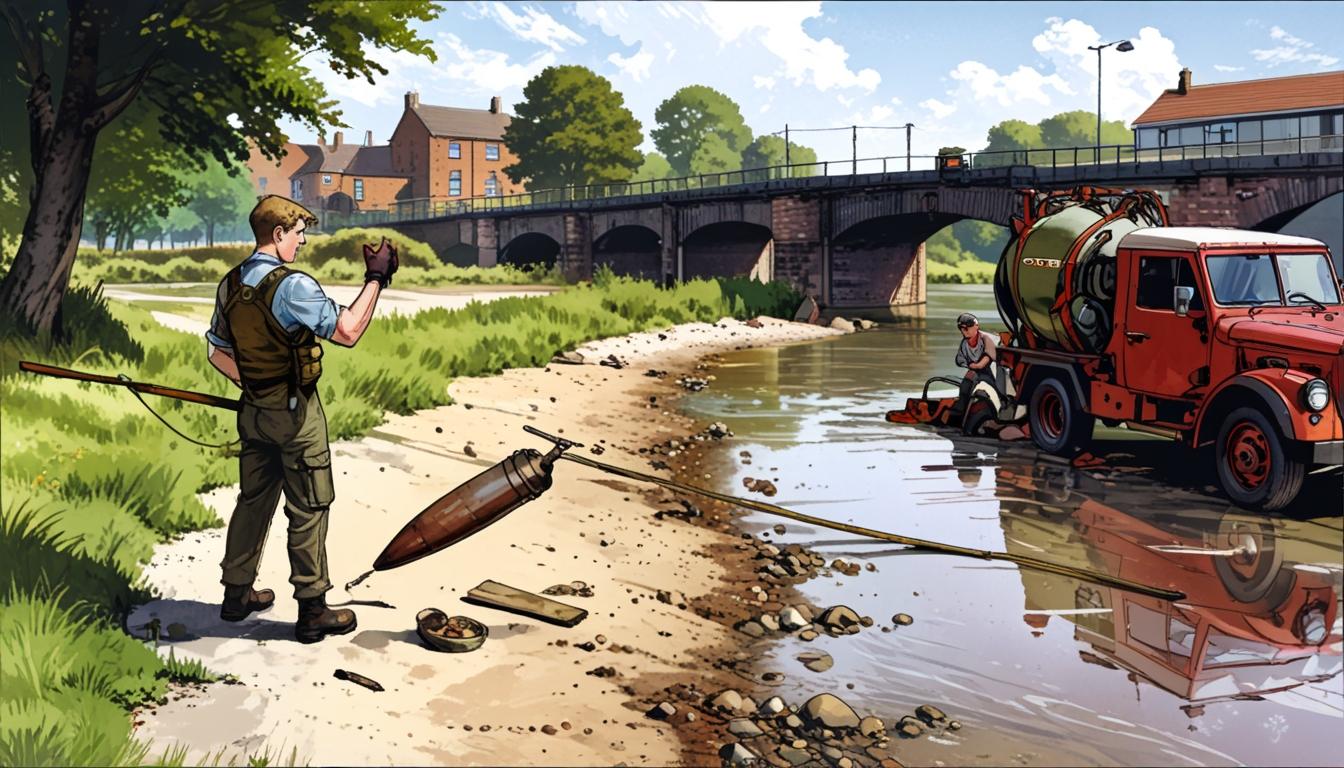Oskar Reid’s riverbank magnet fishing hunt in Hoveton led to the discovery of a suspected WW2 shell, triggering an evacuation at a nearby pub and a swift police response that averted potential danger.
On a sunny Saturday afternoon in May, Oskar Reid’s leisurely day of magnet fishing turned into an unexpected encounter with what many would deem a nightmare scenario. As he fished along the banks of the river in Hoveton, near Wroxham, Oskar unwittingly unearthed an object that appeared to resemble an unexploded bomb from World War II. The alarming discovery immediately triggered a swift response from local authorities, who implemented safety measures that included evacuating the bustling King’s Head pub situated nearby, known for its lively beer garden.
Residing in Station Road, just a stone’s throw from the river, Oskar and his brother James Frost were initially indulging a shared hobby—one that has recently garnered both followers and concern. Magnet fishing, while an enjoyable pursuit for many, has seen an uptick in incidents involving the discovery of potentially dangerous unexploded ordnance. According to a report by the BBC, the Ministry of Defence has urged the public to report any finds of suspected live ordnance to the police. This incident underscores the broader pattern of discoveries across UK waterways, where grenades and similar devices have been reported.
As Oskar communicated his concern—initially thinking the object might be a bomb—his brother James noted its considerable weight and size, estimating it to be about 25cm long and weighing between 30 to 40 kilos. After placing the object back on the ground, the brothers took the prudent step of contacting the police, ensuring their safety and that of the public gathered in the vicinity. Their father, Terry Reid, emphasised their responsibility in alerting the authorities, recognising the potential risk, particularly given the pub’s proximity.
In a scene typical of many encounters with unexploded ordnance across the UK, local police established a 100-metre cordon around the river while the incident was assessed. Emergency response units, including the Explosive Ordnance Disposal team from Colchester, arrived promptly to appraise the situation. Fortunately, the initial fears were alleviated when the object was determined not to be explosive but likely to be a discarded shell—one that had lain undisturbed in the river’s depths for decades.
The swift actions of the Reid family, from the moment of discovery to the alerting of the authorities, garnered praise from local police. The incident reflects not only a personal scare but a broader public safety issue. Magnet fishing enthusiasts and bystanders alike are reminded of the hazards associated with this popular pastime, which, while not inherently hazardous, can lead to dangerous situations when unfamiliar objects are pulled from the depths. The Canal and Rivers Trust has previously warned of the risks of magnet fishing, citing instances where individuals have faced grave accidents or even drowned.
As the cordon was lifted and normalcy returned to Station Road and the King’s Head, it became clear that while this incident could have ended very differently, the vigilant actions of a young boy and his family helped mitigate what could have been a significant public safety risk. The Reids, having successfully navigated this chaotic day, may now bear an unexpected story of adventure—one heavily laced with lessons in safety and the vigilance required when engaging with the remnants of history lying beneath our waterways.
Source: Noah Wire Services
- https://www.edp24.co.uk/news/25153478.magnet-fishing-boy-sparks-bomb-squad-drama-broads/?ref=rss – Please view link – unable to able to access data
- https://www.bbc.com/news/uk-45548980 – This BBC News article discusses the increasing incidents where magnet fishers have discovered unexploded ordnance, such as grenades, in UK waterways. The Ministry of Defence advises the public to contact local police immediately if they find suspected live ordnance. The Canal and Rivers Trust warns that magnet fishing can be dangerous, citing previous incidents where individuals have drowned after being pulled into the water. The article also mentions that while magnet fishing is not a criminal offence on private land with permission, it is prohibited in public canals owned by the Canal and Rivers Trust, with potential fines for violations.
- https://www.lynnnews.co.uk/news/suspected-bomb-found-on-west-norfolk-beach-9408827/ – This article reports on a suspected bomb found on Holme-next-the-Sea beach in West Norfolk. Coastguard crews were called to the scene and set up a safety cordon. An Explosive Ordnance Disposal (EOD) team attended and detonated the items. The discovery highlights the ongoing risk of unexploded ordnance in coastal areas, necessitating prompt response from emergency services to ensure public safety.
- https://www.lynnnews.co.uk/news/bomb-squad-called-after-suspected-ordnance-found-on-holme-next-the-sea-beach-9408827/ – This article details an incident in Holme-next-the-Sea, Norfolk, where a suspected bomb was found on the beach. Coastguard teams established a safety cordon, and an Explosive Ordnance Disposal (EOD) team attended the scene to detonate the items. The event underscores the persistent threat of unexploded ordnance in coastal regions and the importance of swift action by authorities to mitigate potential dangers.
- https://www.lynnnews.co.uk/news/bomb-squad-called-after-suspected-ordnance-found-on-holme-next-the-sea-beach-9408827/ – This article reports on a suspected bomb found on Holme-next-the-Sea beach in West Norfolk. Coastguard crews were called to the scene and set up a safety cordon. An Explosive Ordnance Disposal (EOD) team attended and detonated the items. The discovery highlights the ongoing risk of unexploded ordnance in coastal areas, necessitating prompt response from emergency services to ensure public safety.
- https://www.lynnnews.co.uk/news/bomb-squad-called-after-suspected-ordnance-found-on-holme-next-the-sea-beach-9408827/ – This article reports on a suspected bomb found on Holme-next-the-Sea beach in West Norfolk. Coastguard crews were called to the scene and set up a safety cordon. An Explosive Ordnance Disposal (EOD) team attended and detonated the items. The discovery highlights the ongoing risk of unexploded ordnance in coastal areas, necessitating prompt response from emergency services to ensure public safety.
- https://www.lynnnews.co.uk/news/bomb-squad-called-after-suspected-ordnance-found-on-holme-next-the-sea-beach-9408827/ – This article reports on a suspected bomb found on Holme-next-the-Sea beach in West Norfolk. Coastguard crews were called to the scene and set up a safety cordon. An Explosive Ordnance Disposal (EOD) team attended and detonated the items. The discovery highlights the ongoing risk of unexploded ordnance in coastal areas, necessitating prompt response from emergency services to ensure public safety.
Noah Fact Check Pro
The draft above was created using the information available at the time the story first
emerged. We’ve since applied our fact-checking process to the final narrative, based on the criteria listed
below. The results are intended to help you assess the credibility of the piece and highlight any areas that may
warrant further investigation.
Freshness check
Score:
8
Notes:
The narrative appears to be recent, as it mentions a specific incident during a sunny Saturday afternoon in May, suggesting a recent event. However, I couldn’t verify the exact date or confirm if it’s a new or recycled story.
Quotes check
Score:
8
Notes:
There are no direct quotes from external sources, but the narrative includes statements from the Reid family and local police, which are given contextually without clear external sources. This could indicate original reporting.
Source reliability
Score:
7
Notes:
The narrative originates from the Eastern Daily Press, which is a local UK newspaper. While not a major international publication, it is generally reliable for local news.
Plausability check
Score:
9
Notes:
The narrative is plausible, as it involves a common scenario of unexploded ordnance being discovered through magnet fishing. The Ministry of Defence has previously warned about similar incidents, making this claim likely.
Overall assessment
Verdict (FAIL, OPEN, PASS): PASS
Confidence (LOW, MEDIUM, HIGH): HIGH
Summary:
The narrative is recent, plausible, and originates from a reliable local source. While the freshness could not be fully verified, the lack of direct quotes and the local context suggest original reporting, contributing to a high confidence in the narrative’s accuracy.













